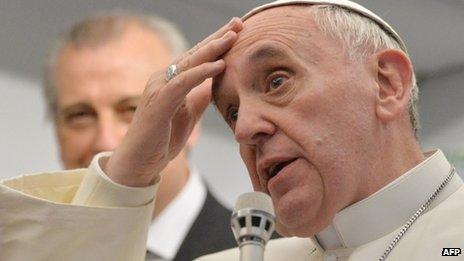Pope Francis strikes an unusual new tone
- Published

Pope Francis plans to spend August preparing for some radical changes
When popes travel, there are three levels of communication.
First there are the crowds, the gut reaction and the enthusiasm of the millions of faithful and of the simply curious who turn out to see the new man in white, the latest successor to Saint Peter.
In Rio, the welcome Pope Francis received on the streets and particularly along the Avenida Atlantica at Copacabana beach was rapturous. Three million people gathered on the sands to hear and see him project his image of a poorer, simpler church.
Then there's the religious message.
During his week-long visit to Brazil, Pope Francis laid down a revolutionary blueprint for the future of the Catholic Church, not only in Latin America but worldwide.
Using very simple, direct language - in contrast to the sometimes obscure and wordy "Popespeak" of his immediate predecessors - he challenged common notions of modernity and progress, and asked difficult questions of his more than 1.3 billion followers.
He spoke mainly in the language in which he feels most comfortable, his native Spanish, often eschewing Brazilian Portuguese, the language spoken by his hosts. But his message came across with startling clarity.
He told a crowd of 30,000 young Argentine Catholics attending World Youth Day in Rio to "make a mess" in their dioceses, to "stir things up", to shake up the comfort, self-satisfaction and clericalism of a Church closed in upon itself. "Don't forget to disturb complacency, but please don't water down the faith!" Francis said.
"The Church must be taken into the streets," he said in the cathedral of Rio. "If not, the Church becomes an NGO. And the Church cannot become an NGO."
This was not a call to revolution, simply an endorsement of the frustration experienced by millions of young people, both in the developing world and in industrialised countries, who have no jobs nor any immediate prospect of dignified work.
In the huge beehive-shaped Cathedral of Rio, illuminated by strips of brilliant stained-glass windows, he suggested that the Catholic Church should also slow down its pace a bit.
"People today are attracted by things that are faster and faster, rapid internet connections, speedy cars and planes, instant relationships," Pope Francis told the biggest gathering of Catholic bishops in half a century.
"At the same time, we see a desperate need for calmness, I would say even slowness. Is the Church still able to move slowly, to take the time to listen, to have the patience to mend and reassemble? Or is the Church itself caught up in the frantic pursuit of efficiency?"
Disarming frankness
The third level of communication is when the Pope talks off-the-cuff to journalists. Speaking on the plane which brought him back to the Vatican from Rio, he fielded questions on a wide range of subjects ranging from how he intended to resolve the money laundering scandal at the Vatican Bank to allegations about a "gay prelates lobby" inside the Church's headquarters.
He was disarmingly frank. He said he didn't know yet how the story of the Vatican Bank was going to end. A Vatican accountant is currently in jail being questioned by Italian prosecutors who believe that some Italian businessmen may have been using the Vatican as a sort of fiscal paradise and tax haven.
On the question of the existence of a so-called "gay lobby" inside the Vatican, Pope Francis quipped that he still had to find anyone whose Vatican ID described him as gay. He denied outright Italian media reports about a long-ago gay scandal involving a prelate who is now in charge of the Vatican residence which is the Pope's new home.
Pope Francis, the first ever pontiff from Latin America, has struck an unusual new tone at all levels of communication.
Now that he is back at his desk in his modest Vatican quarters, he has some important decisions to make about the future governance of his Church.
Normally the cardinals who run the Holy See are off on their long summer holidays at this time of year. But Pope Francis' seasons are not the same as those of his predecessors. In the Southern Hemisphere, where the bulk of his international flock now lives, it is winter.
Pope Francis plans to spend the month of August preparing for some radical changes in the future governance of his worldwide Church. Be prepared for some big surprises.